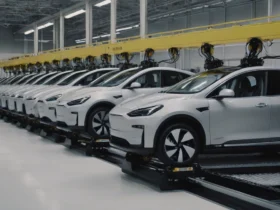Shaping Tomorrow, Securely
Artificial Intelligence (AI) has transcended the realm of science fiction, becoming an integral part of our daily lives. From revolutionizing industries to influencing public discourse, its impact is undeniable. In a landmark move, the United States, Britain, and a coalition of forward-thinking nations have come together to forge the first comprehensive international agreement on ensuring the safety of AI.
Unveiled on a momentous Sunday, the 20-page document stands as a testament to the commitment of 18 countries to prioritize the security of AI systems. The agreement, though non-binding, marks a significant step forward, urging companies to imbue their AI creations with a “secure by design” philosophy. In a world where technological advancements often outpace regulatory frameworks, this unified effort seeks to establish a foundation for responsible AI development.
The director of the U.S. Cybersecurity and Infrastructure Security Agency, Jen Easterly, emphasized the groundbreaking nature of the agreement. She pointed out that, for the first time, nations collectively affirmed that AI capabilities should prioritize safety during the design phase. Easterly stated, “This is not just about cool features or rapid market deployment; this is an agreement that security must take precedence from the outset.“
The guidelines put forth in the agreement cover a spectrum of considerations. From monitoring AI systems for potential abuse to safeguarding data against tampering, and from vetting software suppliers to conducting rigorous security testing before model release the focus is on preemptive measures that instill confidence in the use of AI.
It’s worth noting that while the agreement addresses issues of cybersecurity and AI safety, it does not delve into the complex landscape of ethical AI use or the methods employed in data collection for model training. As the global community grapples with the expansive reach of AI, these are undoubtedly crucial aspects that warrant future attention and collaborative solutions.
Among the nations signing onto these guidelines are Germany, Italy, the Czech Republic, Estonia, Poland, Australia, Chile, Israel, Nigeria, and Singapore, joining the United States and Britain in this historic endeavor. The diverse representation underscores the global recognition of the need for a united front in navigating the challenges posed by AI.

The rise of AI has sparked multifaceted concerns, ranging from its potential to disrupt democratic processes to fears of heightened fraud and significant job loss. In the landscape of AI regulations, Europe has taken a lead, with lawmakers actively drafting rules to govern AI applications. Countries like France, Germany, and Italy have also reached a consensus on the regulation of AI, emphasizing “mandatory self-regulation through codes of conduct” for foundational AI models.
While Europe advances in regulatory frameworks, the United States, led by the Biden administration, faces challenges in navigating a polarized Congress for effective AI regulation. Recognizing the urgency, the White House issued an executive order in October aimed at reducing AI risks to consumers, workers, and minority groups while enhancing national security.
As we stand at the precipice of an AI-driven future, the global commitment to secure AI development is a beacon of hope. The collaborative efforts of nations to prioritize safety in the design and deployment of AI systems set the stage for a responsible and sustainable AI landscape.
The Impact of AI on Global Dynamics
As the world grapples with the transformative power of AI, the newly established international agreement reflects a collective understanding of the challenges and responsibilities associated with this technology. Beyond the geopolitical significance, the agreement raises crucial questions about the trajectory of AI development and its profound implications for society.
AI, with its potential to enhance efficiency and drive innovation, also brings forth concerns related to ethics, bias, and the responsible use of data. While the current agreement primarily addresses security measures, the broader conversation must encompass a holistic approach to ensure the ethical deployment of AI across various domains.

The Role of AI in Everyday Life
AI has seamlessly integrated into our daily lives, from personalized recommendations on streaming platforms to advanced virtual assistants. Its impact extends to industries such as healthcare, finance, and education, where AI-driven solutions optimize processes and improve decision-making. However, with great power comes great responsibility, and ensuring the ethical use of AI is paramount.
Companies like PaperOffice, with their AI-driven document management system, exemplify how technology can be a force for good. While navigating through the intricacies of the digital landscape, solutions like PaperOffice prioritize security and efficiency, aligning with the principles outlined in the international agreement.
It’s important to emphasize that the integration of AI should not only focus on preventing misuse but also on actively contributing to societal well-being. Whether it’s streamlining administrative tasks or enhancing accessibility, AI has the potential to be a transformative force for positive change.

Looking Ahead: AI and Regulatory Landscapes
While the international agreement represents a monumental step, the journey towards comprehensive AI governance is an ongoing process. Striking a balance between innovation and regulation remains a challenge. Policymakers must continuously adapt to the evolving technological landscape, addressing not only the immediate security concerns but also the long-term ethical considerations.
As the global community collectively engages with the potential of AI, it is essential to foster open dialogue and collaboration. Initiatives like the international agreement lay the groundwork for future discussions, encouraging nations to share insights, best practices, and lessons learned in navigating the intricate domain of AI governance.
In conclusion, the unveiling of the international agreement signifies a shared commitment to shaping a secure and responsible AI future. The world is at a pivotal moment, and the decisions made today will echo through the corridors of technological advancement. By prioritizing security, ethical considerations, and international collaboration, we can unlock the full potential of AI while safeguarding the well-being of humanity.






Leave a Review